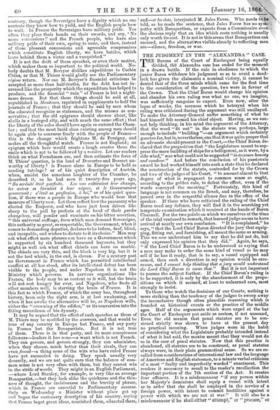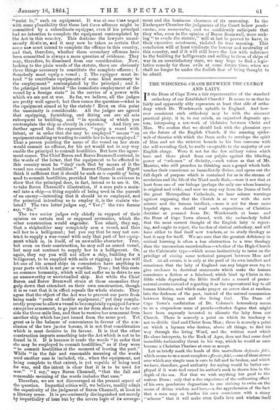THEJUDGMENT IN THE "ALEXANDRA " CASE. T HE Barons of the
Court of Exchequer being equally divided, thb Alexandra case has ended for the moment in a drawn battle. If the rule in obedience to which the junior Baron withdrew his judgment so as to avoid a dead- lock has given the claimants a nominal victory, it cannot be denied that of the three minds which came for the first time to the consideration of the question, two were in favour of the Crown. That the Chief Baron would change his opinion and abandon his own ruling was what no one, we imagine, was sufficiently sanguine to expect. Even now, after the lapse of weeks, the soreness which he betrayed when his ruling was criticized during the argument was still unallayed. To make the Attorney-General suffer something of what he had himself felt seemed his chief object. Having, as we can- not help thinking, in his mind the argument of the Attorney, that the word "fit out" in the statute was, perhaps, large enough to include " building "—an argument which certainly goes too far, but is, nevertheless, one that it was quite proper that an advocate should present to the Court,—the Chief Baron de- clared that the proposition that "the Legislature meant to sup- press the mere building of ships for a belligerent, as it were, by a side wind," was what could not be suggested "in common honesty and candour." And before the conclusion of his passionate award he had worked himself into such a state that he declared the construction of the statute, contended for by the Crown and two of the judges of his Court, " to amount almost to that degree of what is repugnant to common sense as ought, according to the golden rule, to defeat the effect, even if the words conveyed the meaning." Fortunately, this kind of language is not common on the Bench, and may, therefore, be passed over in the respectful silence due to the office of the speaker. If those who have criticized the ruling of the Chief Baron need any defence, they will find it in the searching yet temperate examination which it received at the hands of Baron Channell. For the two points on which we ourselves at the time of the trial ventured to remark, that learned judge seems to have arrived at nearly our own conclusion. "It is complained," he says, " that the Lord Chief Baron directed the jury that equip- ping, fitting out, and furnishing, all meant the same as arming. This we now understand him to say that he did not do, but only expressed his opinion that they did." Again, he says, " if. the Lord Chief Baron is to be understood as saying that a man may make to order the same kind of vessel as he may sell if he has it ready, that is to say, a vessel equipped and armed, then such a direction in my opinion would be erro- neous, and I cannot help thinking that a jury would understand the Lord Chief Baron to mean that." But it is not important to pursue the subject further. If the Chief Baron's ruling is to be supported, it is only by the abandonment of the propo- sitions on which it seemed, at least to unlearned ears, most strongly to insist. To those who watch the decisions of our Courts, nothing is more striking than the tendency of the judges to sweep away the inconclusive though often plausible reasoning which is founded on historical events or the practice of the middle ages. Half of the arguments which were urged at the bar the Court of Exchequer put aside as useless, if not unsound. Even the old maxim that penal statutes are to be con- strued strictly was shown to have at the present day no practical meaning. When judges were in the habit of considering what the Legislature probably intended instead of what it had said, the maxim meant that they would not do so in the case of penal statutes. Now that this practice is abandoned, all statutes are to be construed, as penal statutes always were, in their plain grammatical sense. So we are re- called from considerations of international law and the language of American and English statesmen, to a minute verbal criticism of a most " faulty and imperfectly worded" enactment. This renders it necessary to recall to the reader's recollection the important portion of the 7th section of the Act. It creates four offences. It is a misdemeanour " if any person within her Majesty's dominions shall equip a vessel with intent or in order that she shall be employed in the service of a foreign power, with intent to commit hostilities against a power with which we are not at war." It will also be a misdemeanour if he shall either " attempt," or " procure," or "assist in," such an equipment. It was at one time urged with some plausibility that these last three offences might be committed by a subordinate equipper, even if his principal had no intention to complete the equipment contemplated by the Act in this country. This doctrine the lawyers unani- mously diseldm, and it may now be taken as certain that some one must intend to complete the offence in this country, and that, therefore, whether these secondary offences have been, committed is always a mere question of evidence. They may, therefore, be dismissed from our consideration. Now, looking to the plain words of the statute, there are obviously three things necessary to constitute the complete offence ; 1. Somebody must equip a vessel ; 2. The equipper must in- tend " to contribute equipments of some kind necessary to the employment" contemplated by the principal ; and 3. the principal must intend "the immediate employment of the vessel by a foreign state" in the service of a power with which we are not at war. So far, we believe, all the judges are pretty well agreed; but then comes the question—what is the equipment aimed at by the statute ? Even on this point the unanimity is considerable. All the judges are agreed that equipping, furnishing, and fitting out are all acts subsequent to building, and "in speaking of which you contemplate the ship as already in existence." And they are further agreed that the expression, "equip a vessel with intent, or in order that she may be employed " means " an equipment enabling or tending to enable her to be so employed." Thus a person painting the name of the vessel on her stern would commit no offence, for his act would not in any way enable the principal to commit hostilities. But here the agree- ment ceases. The Chief Baron and Baron Bramwell contend, in the words of the latter, that the equipment to be effected in this country must be "itself such that by means of it the vessel can commit hostilities." Barons Channel and Pigott think it sufficient that it should be such as is capable of being used to commit hostilities, provided that there is evidence to show that the principal does, in fact, intend so to use it. Or, to take Baron Channell's illustration, if a man puts a main- sail into a ship—a thing capable of being used in the pursuit of an enemy—intending that it should be so employed, and the principal intending so to employ it, is the statute vio- lated? The two latter judges say, " Yes ;" the two former say, "No."
The two senior judges rely chiefly in support of their opinion on certain real or supposed anomalies, which the other construction would engender. You admit, they say, that a shipbuilder may completely arm a vessel, and then sell her to a belligerent ; but you say that he may not con- tract to supply a war-vessel with only that part of her equip- rA1Vai which is, in itself, of an unwarlike character. True, but even on their construction, he may sell an armed vessel, but may not contract to supply her to a belligerent. Or, again, they say you will not allow a ship, building for a belligerent, to be supplied with sails or rigging ; but you will let one of his armed ships in commission have anything in your ports which is not per as warlike. True ; but this rests on common humanity, which will not suffer us to drive to sea an unseaworthy or unvictualled ship. But while the Chief Baron and Baron Bramwell strain at these anomalies they gulp down that attendant on their own construction, though it is so vast that it in effect repeals the whole statute. They agree that the object of the Act was to prevent our ports from being made "ports of hostile equipment ;" yet they compla- cently propose to allow a vessel to be completely equipped for war except her armament, to go just so far from shore as to be out- side the three-mile line, and then to receive her armament from another ship which has just issued from the same port. Yet great as is the balance of convenience in favour of the con- clusion of the two junior barons, it is not that consideration which is most decisive in its favour. It is that the other construction imports something into the Act which is not to be found in it. It is because it reads the words " in order that she may be employed to commit hostilities," as if they were " to commit hostilities at the moment of leaving the port." While " in the fair and reasonable meaning of the words used another case is included, viz., when the equipment, not being complete to that extent, is yet capable of being used for war, and the intent is clear that it is to be used for war." " I say," says Baron Channell, " that the full and reasonable meaning of the words includes that case." Therefore, we are not discouraged at the present aspect of the question. Impartial critics will, we believe, readily admit the superiority of the judgment of Baron Channell, at least in a literary sense. It is pre-eminently distinguished not merely by impartiality of tone but by the severe logic of its arrange- meat and the luminous clearness of its reasoning. In the Exchequer Chamber the judgments of the Court below ponde- rantur, non numerantur, and we confidently anticipate that they who, even in the opinion of Baron Bramwell, were seek- ing " to evade the statute," will at last be proved to have, in their excessive astuteness, violated its true meaning. This conclusion will at least vindicate the honour and neutrality of this country, and if it will still leave the law with reference to the building for belligerents and selling to them of ships of war in an unsatisfactory state, we may hope to find a legis- lative remedy for these evils at some future time, when we shall no longer be under the foolish fear of being thought to be afraid.































 Previous page
Previous page